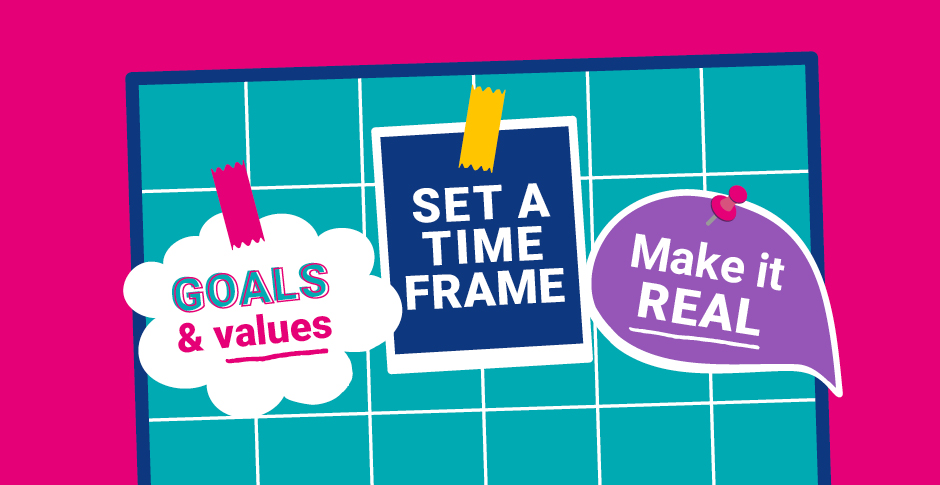5 expert approved ways of sticking to your New Year's career resolutions
Many of us start a new year by setting resolutions or goals, but as time goes by, we don’t always achieve them. We may have set too lofty a goal, or so many resolutions at once that we don’t know where to start – and so we don’t.
Or sometimes we don’t reflect enough before setting a resolution, and its lack of personal meaning can result in us forgetting about it as the year goes on. In fact, 1 in 3 of us have already given up on our New Year’s resolution for 2022.
It’s important to set career goals – they provide a sense of purpose, which can also make your job more enjoyable. But it’s equally important to set goals that are achievable.
If, for example, you want to become Sales Manager this year but you’ve only just joined the company as a Junior Sales Associate, you may be putting too tight a time limit on yourself. Some goals take multiple steps to achieve, so you’re better off making the next step your goal for the time being.
Leah Lambart is a career coach with Relaunch Me and an expert when it comes to achieving career goals. Here are her five key tactics for sticking to your New Year’s resolutions:
- Be ready and willing to change.
Making a successful change in your career requires time, energy and sustained commitment, so before you commit to it you need to think about why it’s so important to you, says Lambart.
“If you decide this is something you want to do, find an accountability buddy to keep you on track. This could be a friend, colleague, fellow career-changer or a career coach. You could also think about creating a vision board of what you hope your life will look like once you complete the change. This will keep you more focused, even when there are a few hiccups along the way.”
- Think about what you value.
The change you’re craving might not simply be a different role, but greater flexibility, a better work-life balance, higher income, more meaningful work, or more creative work, says Lambart.
“Therefore, to help you stick to your resolution of changing careers, focus not only on the career change, but also on the positive change to your life when the career change is implemented, such as more time spent with family, less weekend work or overseas travel, greater work satisfaction, more energy to play with the kids, or more time to take up hobbies.” You’ll be more likely to achieve your career goals if you have more meaning attached to them.
- Be specific with your goals.
“An effective change usually requires a number of steps, so it’s easy to become overwhelmed by what’s involved. If you break the change down into baby steps and make them more specific, then the career-change process will feel less overwhelming and you’ll be more likely to commit to it long-term,” says Lambart.
To make your goals more achievable, use the S.M.A.R.T. method. By making resolutions that are Specific, Measurable, Attainable, Relevant and Timely, you’ll find you can actually stick to them and achieve them.
- Have a time frame in mind.
“Attaching dates to each step will keep you more accountable and will allow you to focus on the tasks at hand, rather than being overwhelmed by the enormity of a change,” says Lambart. “Talk to others who have made a similar change, to understand the time you may need to allow for each step.” The important thing is to be realistic with your time frames.
Here’s an example from Lambart of how specific goals attached to dates might look like for the year if a career change is what you’re after:
- February: Complete career testing to identify careers that are aligned to your personality type, strengths, values and interests
- June: Conduct online research of shortlisted career options to confirm shortlisted options.
- July/August: Approach people in these industries to conduct informational interviews – aim for 3 information interviews per career area.
- September: Choose 1 career area by end of September.
- October: Apply for courses to commence the following year.
- February the following year: Commence study and tailor your resumé for internship opportunities.
- March: Start the search for internships and/or part-time work in new career area.
- Make it real.
Tell people about your dreams and aspirations. Sharing your resolutions helps make them real and will encourage your family and friends to become your cheerleaders.
Surround yourself with people who will lift you up when you are doubting yourself as some bumps along the way are to be expected when it comes to making a career change” says Lambart.
Now that you know what an achievable New Year’s resolution looks like, take a moment to review or create three career goals that you’d like to achieve this year. By breaking down your big New Year’s resolutions into SMART goals, you’ll make it easier to achieve them and land a job you love.
Source: Independent research conducted by Nature of behalf of SEEK, interviewing 4800 Australians annually. Published November 2022.
